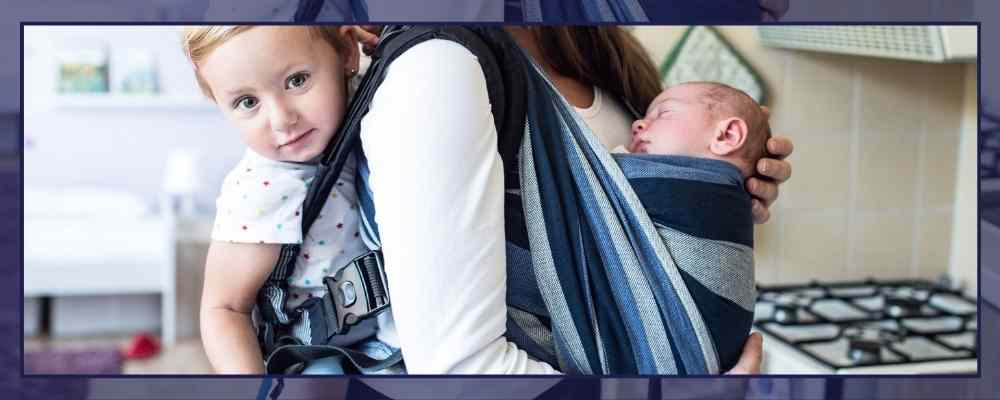Motherhood is beautiful, but it can also be challenging. The changes that come with pregnancy, childbirth, and parenting can affect physical and mental health. The signs of anxiety or depression can sometimes be brushed aside, misunderstood, or never talked about at all. Here are the stories of two local moms who share their postpartum experiences so that other moms can feel seen and supported and know they’re not alone.
E.’s Story:
It could have been a combination of things, but I was pregnant with our fourth child as we moved to a different town on the weekend that COVID-19 shut-downs started. Two weeks later, I had my baby.
I remember having a nurse call a couple of times to check in on me and ask if I was experiencing any postpartum depression, which seemed like such an odd question because why would I be depressed? I wanted this baby, and now he’s here, and everything’s great! Recovery from my first three kids had gone well, and I don’t think I understood what depression felt like.
And so, when it hit me, I didn’t recognize it right away. I kept thinking, “What’s wrong with me?” I felt numb. I didn’t feel like smiling or laughing; I just cried all the time. I wondered if I would ever be happy again. I had never experienced feelings like this in my life, and it lasted for months, far longer than it should have.
I had always been into exercise and would gradually get back into working out after my previous pregnancies, but the pandemic had closed the gyms down. Finally, amidst my loneliness, it finally dawned on me, “I don’t have to be in the house this whole time – why am I not going outside to at least take a walk?” So I started going on walks to get some exercise and fresh air. As I got my body moving, the world felt much better, and my mood improved as the depression faded away, but I don’t know that I quite made the correlation at the time.
Fast forward to baby number five…who was a surprise. Thinking we were done, I had moved on with other plans and had settled into a routine that included fun fitness classes with music and people. But being pregnant and giving birth slowed me down, and it was hard to adjust. I loved this baby more than anything, but I felt like I’d lost my identity.
Loneliness and sadness crept back in, but by now I’d learned that exercise wasn’t just about staying fit—it was about my mental health. I truly believe it increases my energy and happiness and makes me a better mom. That’s what I was missing the last time. So, after four weeks, I jumped back into the classes, and the depression got significantly better.
Looking back, I probably would have paced myself a little more, maybe started with some walks, knowing that things were going to get better. I think moms should know that there’s no specific time frame to recover from postpartum depression, but it does get better. Talk to a husband, a friend, maybe a therapist; getting help is not a bad thing.
T.’s Story:
Before my pregnancy, I felt healthy—I was a dance student and instructor, physically active for about four hours a day. I loved walking, rock climbing, and canyoneering. Mental healthwise, I had some anxiety and was on medication, and I felt like I had a good handle on it.
Around six weeks into my pregnancy, I started dealing with severe morning sickness that turned into hyperemesis gravidarum (HG). It was much worse than I expected—I couldn’t keep food or water down for over 24 hours at a time. I needed IVs to stay hydrated and was on modified bed rest for most of my pregnancy. It was draining mentally and physically—I had
lost a lot of weight and strength and developed fears about food and public spaces. The anxiety from HG made it feel like a never-ending cycle.
I was nervous about taking medication during pregnancy, but after consulting with my doctor, I started a mood stabilizer and felt much more balanced. I was concerned about the effects on my baby, but I felt reassured by the doctors’ guidance.
Shortly after delivery, the anxiety hit hard, especially with worries about my baby’s feeding and sleep. Sleep deprivation made everything worse. I started having thoughts that were troubling, like my son being better off with someone else. But when I realized these thoughts weren’t normal, I reached out to my support system—my husband, my mom, and others—to talk about it. Their feedback was invaluable and helped me understand I wasn’t alone.
I also went to the women’s clinic for a mental health screening. The staff were supportive and didn’t judge me for how I was feeling. They assured me that postpartum depression and anxiety were common, and they helped me find the right medication. Within a week of starting the medication, I felt like a different person—more like myself.
Physically, recovery was tough due to a pelvic floor injury, which made it difficult to get back into activity. I felt discouraged watching others recover faster, but physical therapy helped a lot.
The whole experience taught me a lot about managing mental health, and I now feel more prepared to handle challenges. My son is doing great—he’s healthy, very intelligent, and right on track developmentally.
If I could go back and give advice to new moms, I would say don’t hesitate to reach out for help if you think you’re struggling with postpartum depression or anxiety. Be honest in your screenings, and don’t feel guilty about taking medication if it’s what you need. For me, it was a game-changer, allowing me to truly enjoy motherhood.
Most new moms experience “baby blues” after childbirth, which include mood swings, crying, anxiety, and sleeping problems. Baby blues start in the first 2 to 3 days after delivery and can last up to two weeks. But some women (about 15% in Utah) experience a more severe, long-lasting condition known as postpartum depression (also called perinatal depression because it can start during pregnancy and continue after childbirth). Moms and their loved ones should talk about any concerns with healthcare providers. Almost all postpartum depression can be resolved, especially with treatment. Visit swuhealth.gov/maternal for more information.
This article originally appeared in the Spring 2025 issue of HEALTH Magazine.






